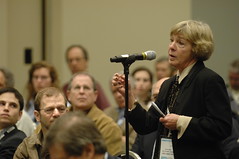Just after the “Bringing Women to the Fore and Advancing Peace” session, an elderly woman approached me to respond to a question I had asked about intersectionality, a term used in modern feminist theory to describe how all forms of oppression are connected. The idea is that you can’t eradicate racism without getting rid of sexism, or homophobia. Thus, women’s rights activists should also fight for the rights of people of color, LGBTQ, immigrant workers, and similarly marginalized folks. (Forgive me, bell hooks, for the really crude oversimplification of the term.)

The woman introduced herself, did a quick run-through of her feminist resume, and then ripped into me. She said that I was wrong to assume that Second-wave feminists weren’t concerned with “those things.” She didn’t like the fact that I used the term intersectionality because it is too academic a term for this context. If I’m so concerned about these issues, I should call them “multiple voices or something to that effect.” It was great.
Maybe she had a point. Microsoft Word’s spell-checker has no spelling suggestions for “intersectionality.” Sorry Angela Davis, guess it’s not a word yet! Still, my initial instinct was to correct her. Intersectionality isn’t about “multiple voices.” It’s about moving beyond “men are equal to women” and into the territory of accountability, solidarity, and privilege. It’s about using our power to address really uncomfortable issues.
But I just blogged about the infuriatingly challenging task that is knowing when to discuss what. So I let it go. I waited for her to finish her rant, smiled, and thanked her for her advice. Pointing out her mischaracterization of the term would only have resulted in a screaming match between two really opinionated people who actually admire each other very much. I wasn’t about to change her mind on that issue. But I did hopefully convince her that my generation isn’t a bunch of Facebook addicts and twitter brats. Among other things, the incident illuminated a generational gap facing not only the feminist community, but also the Jewish community. And that’s awesome! It means we’re changing. If the older generation isn’t pissed off at the younger generation and vice versa, something’s wrong. You can measure the potency of a particular moment by the amount of tough love the older generation must show its offspring.
Hey, Microsoft Word doesn’t recognize “Facebook” either. Maybe there’s hope after all.
